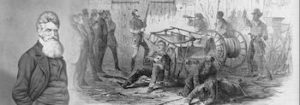
Drawing of the raid onHarper Ferry (Harpers Weekly)
On this date in 1859, white-American abolitionist John Brown and his followers raided the Harpers Ferry Virginia arsenal.
This was a turning point in the movement that led to the American Civil War and the legal end to African slavery in the United States. Brown planned that he and his men would establish a base in the Blue Ridge Mountains to help runaway slaves and launch attacks on slaveholders. This plan had been described to potential funders two years earlier.
He had been ready in 1858 to launch this war, but Brown had to postpone the launch because one of his followers threatened to reveal the plan, which the blackmailer did follow through on. As a result, Brown went into hiding. The following summer, after a one-year delay, Brown was ready. He rented a farm in Maryland across the Potomac River from Harpers Ferry. He collected his arms and waited for his "army" to get there. A problem with Brown's plan was that many of the men he had recruited the previous year had changed their minds, moved away, or didn't think it would work.
Even Henry Highland Garnet, the abolitionist who advocated insurrection, felt the slaves were unprepared. Brown also met with Frederick Douglass in August 1859. Brown told his friend of his intentions for Harpers Ferry rather than using guerilla warfare from the mountains. Douglass concluded that attacking the arsenal was, in effect, attacking the federal government and a grave mistake. "You're walking into a perfect steel trap," he said to Brown, "and you will never get out alive."
On October 16, Brown set out for Harpers Ferry with 21 men: five Blacks, including Dangerfield Newhy, who hoped to rescue his wife, still a slave, and 16 whites, including two of Brown's sons. Leaving after sundown, the men crossed the Potomac and walked all night in heavy rain, reaching the town at 4 a.m. They cut telegraph wires and made their assault. First, they captured the federal armory and arsenal. They then captured Hall's Rifle Works, a weapons supplier to the government. Brown and his men rounded up 60 prominent town citizens and held them as hostages, hoping their slaves would join the fight, but this did not happen.
The local militia pinned Brown and his men down. Under a white flag, one of Brown's sons was sent out to negotiate with the citizens. He was shot and killed. News of the raid was relayed by the train conductor heading to Baltimore and reached President Buchanan, who dispatched marines and soldiers under the leadership of Colonel Robert E. Lee. By the time they arrived, eight of Brown's 22-man army had already been killed. Lee's men moved in and quickly ended the insurrection. In the end, ten of Brown's men were killed (including both Blacks and both of his sons), seven were captured (two of these later), and five escaped.
Brown, who was seriously wounded along with the other captives, was taken to Charlestown, VA (now Charles Town, WV). There, they were quickly tried, sentenced, and then executed. John Brown's statements during his trial reached the nation, inspiring many with his righteous resentment toward slavery. The raid ultimately rushed the beginning of the war between the states.
The African American Desk Reference
Schomburg Center for Research in Black Culture
Copyright 1999 The Stonesong Press Inc. and
The New York Public Library, John Wiley & Sons, Inc. Pub.
ISBN 0-471-23924-0